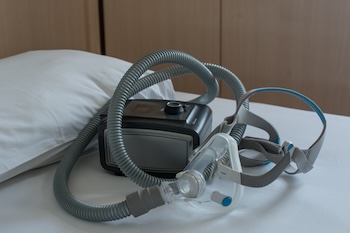
Sleep apnea is a condition in which an individual stops and starts breathing repeatedly throughout their night of sleep. There are three types of sleep apnea and all three have the potential to be dangerous if untreated. Not only can sleep apnea prevent you from getting a restful and full night of sleep, but it may also increase your risk of developing other chronic conditions such as type 2 diabetes, metabolic syndrome, and high blood pressure. Keep reading to learn about the three types of sleep apnea and why sleep apnea can occur.
Obstructive Sleep Apnea
Obstructive sleep apnea is the most common form of sleep apnea and happens when the muscles of the throat relax, this causes your airway to shrink or close completely. When this happens you are unable to breathe and you are quickly woken up so that you can reopen your airway. This abrupt wake-up often occurs with a gasp or choke and because this may happen several times throughout the night your sleep is consistently disrupted.
Central Sleep Apnea
Central sleep apnea happens when your brain no longer sends a signal to your body that it needs to breathe. When this happens you may be sleeping without breathing for a brief period. Like obstructive sleep apnea, this disruption in breathing may cause you to wake up with a gasp or choke, again preventing a restful night of sleep.
Complex Sleep Apnea
Complex sleep apnea is a combination of obstructive and central sleep apnea.
Why does sleep apnea occur?
- Obesity is a leading cause of sleep apnea because it contributes to the shrinking of the airway.
- A family history of sleep apnea may increase your risk.
- Sleep apnea occurs significantly more in older adults and males.
- Use of sedatives or alcohol before bed can cause your throat muscles to relax, increasing your risk.
- Smokers are more likely to experience sleep apnea.
- The size of an individual's neck, jaw, tongue, and throat tissue may lead to sleep apnea.
- Individuals who experience nasal congestion are more likely to develop sleep apnea.
Sleep apnea is a serious condition that can prevent you from getting a restful night of sleep and has risk factors in other areas of your life. If you suspect you may be suffering from or have risk factors for sleep apnea we encourage you to talk to your doctor to get the treatment you need to be your healthiest version of yourself!